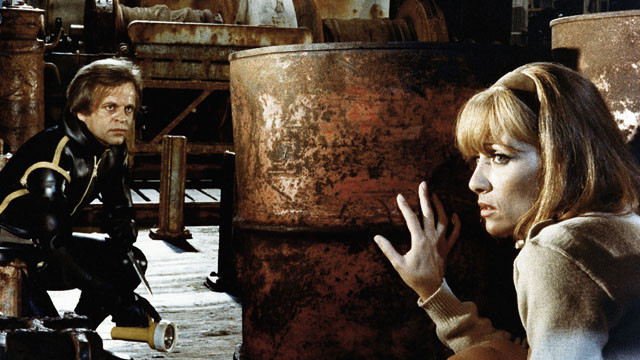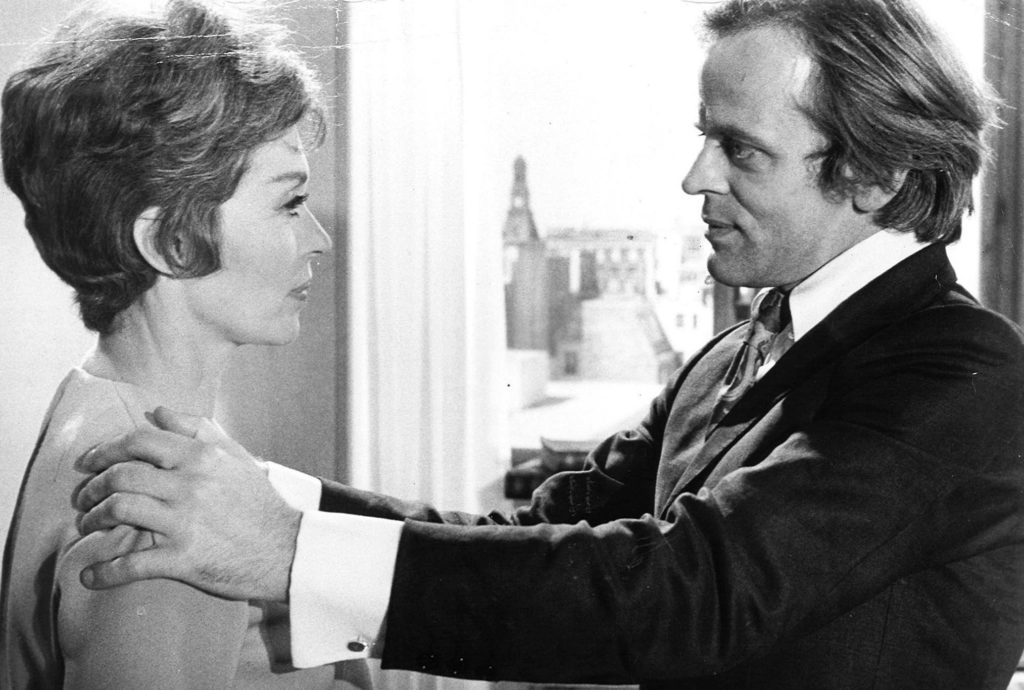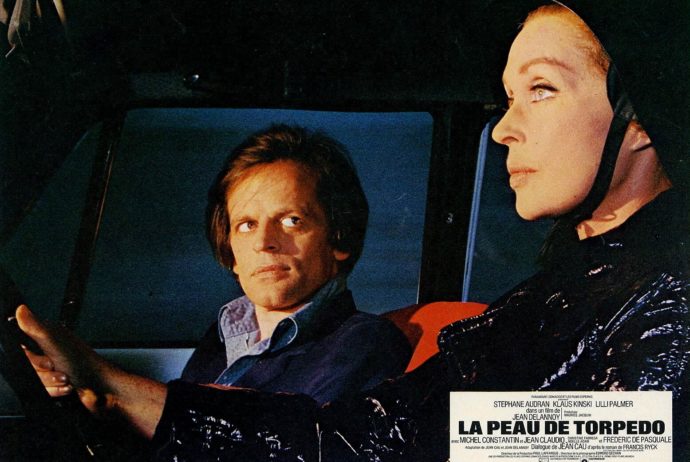Dir: Jean Delannoy
Star: Stéphane Audran, Lilli Palmer, Klaus Kinski, Frédéric de Pasquale
a.k.a. La peau de torpedo, Children of Mata Hari, Pill of Death, The Deathmakers
The jealous Dominique Krestowitz (Audran) is trying to have an affair, yet is unable to go through with it. Turns out this is retaliatory: she suspects her antiquarian husband, Nicolas (de Pasquale) is cheating on her, and becomes certain of this after a friend sees him going into a Paris building, when he’s supposed to be out of town on a business trip. She’s half-right: he is keeping secrets from her, but it’s not an extra-marital sojourn. Nicolas is a member of a Russian spy ring, run by the ruthless Helen (Palmer). As he returns from his latest mission, this has come under threat, and everyone has to go off-grid for a bit: the building is a temporary safe house, and the woman another member of the ring.
Knowing absolutely nothing of this, Dominique rushes to the apartment to confront her “unfaithful” spouse. The resulting fracas leaves both Nicolas and his partner shot dead, and Dominique has to go on the run. This sets off a mess for everyone, as the authorities investigate the corpses, uncovering the espionage cell in the process, after they discover Nicolas’s double-life and the microfilm he took on his mission. As Helen struggles to keep a lid on things, her bosses send over Pavel Richko (Kinski), an assassin tasked with locating and killing Dominique before she can give up what she knows – even though the audience is aware, that isn’t anything of significance.
Director Delannoy was a veteran of the industry, starting in the twenties as an actor, before moving behind the camera the following decade. But he was reviled by many in the French New Wave, François Truffaut famously saying of Delannoy’s Chiens Perdus sans Collier in 1957, that he had seen it three times so as to learn exactly what not to do (“‘il avait vu trois fois afin de savoir exactement quoi ne pas faire.”). Following that and other critical savagings, Delannoy’s career dropped off, but he kept working on journeyman efforts like this, directing his last film at the age of 87, and reaching the century mark before passing away in 2008.
This is based on a book by Francis Ryck call La Peau de torpedo – an odd title, used for the original French release, which translates as “The torpedo’s skin”. I’m not certain of its relevance with regard to the movie. Helen refers to Richko and another spy by the term, saying “The service sent me two torpedoes,” but that’s the only mention of the word the subtitles contain. I presume the book would be more forthcoming, but doesn’t seem to have received any publication in an English translation. It may help explain the plethora of different titles by which this was released worldwide. The movie certainly is ahead of its cinematic time, offering a gritty and down-to-earth portrayal of espionage.
 As a contrast, it came out between On Her Majesty’s Secret Service and Diamonds are Forever, much more the kind of spy films produced during this era. This is closer to Le Carre than Fleming (even if I acknowledge the gap between the 007 novels and their adaptations!), being as interested in the mechanics of the spy business as its characters. The focus for the latter shifts repeatedly, from Nicolas to Dominique to Coster (Michel Constantin), the French counter-espionage agent leading the investigation, to Helen). Two scenes in particular stand out. There’s a long, almost silent depiction of Nicolas’s break-in to his target and, later, another lengthy sequence where another of Helen’s minions, knowing he’s being followed, tries to shake the tail. This switches between him and the French authorities, who know he knows and use all their resources to keep on their target.
As a contrast, it came out between On Her Majesty’s Secret Service and Diamonds are Forever, much more the kind of spy films produced during this era. This is closer to Le Carre than Fleming (even if I acknowledge the gap between the 007 novels and their adaptations!), being as interested in the mechanics of the spy business as its characters. The focus for the latter shifts repeatedly, from Nicolas to Dominique to Coster (Michel Constantin), the French counter-espionage agent leading the investigation, to Helen). Two scenes in particular stand out. There’s a long, almost silent depiction of Nicolas’s break-in to his target and, later, another lengthy sequence where another of Helen’s minions, knowing he’s being followed, tries to shake the tail. This switches between him and the French authorities, who know he knows and use all their resources to keep on their target.
Kinski takes his time showing up, only appearing about 75 minutes into proceedings, although there’s enough of other interest going on here, that I didn’t mind too much. Richko immediately takes charge on meeting Helen, telling her “You’re a friend. You’re welcoming me at Le Bourget airport. I kiss you. Smile, please. Now! That’s an order.” I was amused when he later arrives at her apartment (pausing only to do a little shopping, picking up a particularly lurid robe!) and knocks on the door, when she asks who it is, he deadpans, “James Bond.” As spies go, this could hardly be further from the truth: about the only gadgets on view here are the strychnine pills carried by each of the spy ring, for use in case of capture (explaining yet another of the alternate titles).
Through her contacts, Helen has tracked Dominique to the Normandy port of Fécamp, where the fugitive is hiding out on a ship moored at the docks. However, the cops have also located her, and are mounting a surveillance operation of their own. Richko does an end-run to avoid them, approaching the boat from the ocean-side and sneaking on board to dispose of his target, only for a literal mis-step to prove his undoing, and he falls into the hold, breaking his back. With Helen also in custody after a futile attempt to evade the authorities., he’s not needed: in an act of kindness that’s rare for the film, Coster gives Richko his suicide pill back so he doesn’t have to live out his days, paralyzed and in jail. Before the end credits, there’s still time for a final, downbeat twist – one which perhaps was inspired by a previous 007 film.
Overall, this was better than expected, especially after early scenes where I had no real idea what was going on. For truth be told, that’s the point here: the entire film is based on a huge series of mistakes and misunderstandings, e.g. Nicolas isn’t having an affair, and Dominique has no clue at all about espionage. Yet in the murky world which is spy versus spy, these still prove more than capable of leading to the deaths of just about everyone involved. Even if the fate of Kinski’s character was poorly-handled, you can only appreciate the consistently downbeat tone, and admit its impenetrable nature is entirely by design.

